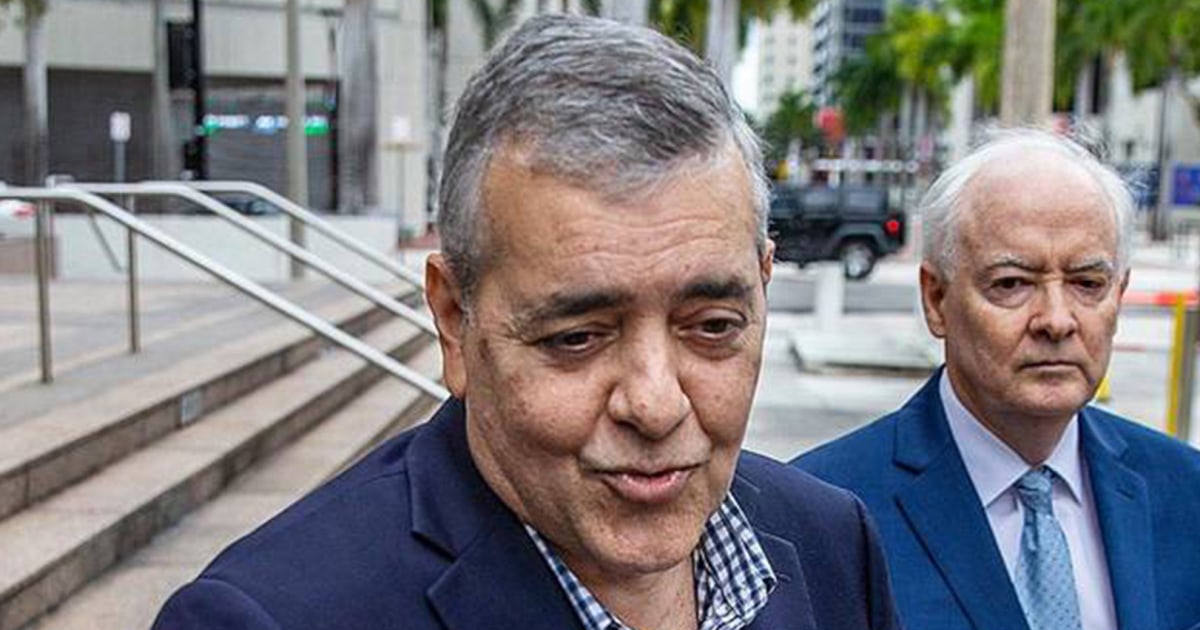Florida
Florida judge blocks quick migrant release policy, raising concerns about overcrowding

El Paso, Texas — A federal judge in Florida on Thursday temporarily blocked the Biden administration from continuing a migrant release policy designed to alleviate overcrowding at immigration holding facilities along the U.S.-Mexico border.
The ruling came just hours before the Title 42 border restrictions expired at 11:59 p.m. EDT Thursday, raising concerns about severe overcrowding in already over-capacity Border Patrol migrant facilities.
U.S. District Judge Kent Wetherell ordered the Biden administration to halt the quick migrant release policy at the same it discontinued the Title 42 pandemic-era order, granting a request by Republican officials in Florida.
In March, Wetherell also blocked a similar Biden administration migrant release policy in a ruling on a lawsuit brought by the Florida attorney general.
Florida is arguing that this new policy is also illegal.
Wetherell’s latest order will expire in 14 days in order to give the Biden administration time to seek an emergency stay on the ruling. Another hearing in the case is scheduled for May 19.
Customs and Border Protection (CBP) criticized Thursday’s ruling but said the agency would comply with it.
“This is a harmful ruling that will result in unsafe overcrowding at CBP facilities and undercut our ability to efficiently process and remove migrants, and risks creating dangerous conditions for border patrol agents and migrants,” CBP said in a statement.
In a filing opposing the request by Florida, the Biden administration said the number of migrants stuck in Border Patrol custody could soar to 45,000 by the end of the month if the expedited releases were blocked in court. On Thursday, Border Patrol had nearly 25,000 migrants in its custody, despite only having the capacity to hold several thousand individuals in stations, processing centers and tents.
The ruling raises the prospect of even higher numbers of migrants being stranded in Border Patrol custody in dangerously overcrowded conditions amid a spike in migrant arrivals.
In the lead-up to the expiration of Title 42, daily migrant crossings along the U.S.-Mexico border have reached record levels, with border officials averaging roughly 10,000 apprehensions per day.
Earlier on Thursday, Border Patrol Raul Ortiz told CBS News that another 60,000 migrants were waiting on the Mexican side of the border, hoping to enter the U.S.
The memo at the center of Thursday’s ruling allows Border Patrol to conduct expedited releases of some migrants without giving them court notices as part of an effort to reduce overcrowding in detention facilities.
Migrants who are found to not be a risk to public safety or national security could be considered for this quick release under the humanitarian parole authority. Those released under this policy, which has been used before during spikes in migrant crossings, will be instructed to check in at U.S. Immigration and Customs Enforcement offices across the country so they can receive a court notice there.
In an interview Thursday, Ortiz, the Border Patrol chief, said the expedited release policy was helping his agency reduce overcrowding, noting that some border sectors were “over capacity.”
“We’re working closely with our NGO partners, our communities to make sure that we release those migrants after they’ve been vetted and cleared, and they pose no significant threat to the community,” he said.

Florida
Former Florida congressman indicted on foreign agent charges

Former Rep. David Rivera, R-Fla., was indicted Tuesday on charges that he violated the Foreign Agents Registration Act and laundered funds in order to “conceal and promote his criminal conduct,” the Justice Department said on Wednesday.
In the indictment, Rivera is accused of working “as an agent” of Raul Gorrín Belisario, a Venezuelan national who the Treasury Department said played a role in a “corruption scheme” to bribe the national treasurer of Venezuela.
Rivera “sought to lobby senior U.S. government officials” on Gorrín’s behalf, attempting to have Gorrín removed from a list he was placed on because of the alleged bribery, according to the indictment returned by the grand jury.
Under the Foreign Agents Registration Act (FARA), anyone who has agreed to work in a certain capacity for a foreign government’s interest, either through the government itself or an intermediary, must register with the U.S. government.
The indictment also alleges that Rivera created shell companies “to conceal and promote his crimes.” The alleged scheme took place in 2019 and 2020, according to the indictment.
The FBI Miami Field Office, which the DOJ said is investigating the case, did not immediately respond to a request for comment Wednesday night. An attorney for Rivera also did not immediately respond to a request for comment.
Rivera was previously arrested and indicted in 2022. Prosecutors alleged in that case that Rivera tried to “act and cause others to act in the United States as an agent of a foreign principal,” referring to the Venezuelan government, without registering with the U.S. government.
The Miami Herald reported on Wednesday that Rivera in a statement referred to the various FARA allegations as “false,” arguing that Tuesday’s indictment was “just another politicized indictment against a Republican, right before the Trump administration brings back sanity and fairness to this weaponization of the justice system.”
Rivera served in Congress from 2011 to 2013.
Florida
AI could be warning you about Florida’s next hurricane

TALLAHASSEE, Fla — The person warning you about Florida’s next hurricane might not be a person at all. Florida’s Emergency Management team rolled out new AI technology Wednesday that, they say, will save lives during future emergencies.
Think of your average weather report. Little music in the background, a baritone meteorologist predicting partly cloudy conditions. Pretty standard, don’t you think?
Think again. AI now has the power to give you an almost identical broadcast to what you’d hear on your car radio, but it’s not a real person, just real information. And a real opportunity, say state officials, to inform people during emergencies.
BEACON (Broadcast Emergency Alerts and Communications Operations Network) is a first-of-its-kind program created as a joint venture between Florida Emergency Management, the University of Florida, and an AI company called Futuri. BEACON gathers emergency alerts and messages from official federal/state/local sources, prioritizes them, and turns them into a 24/7 AI-powered radio station.
Listeners can stream it on the BEACON app or over the air with a regular old radio. Florida’s Emergency Management Director Kevin Guthrie said during Wednesday’s rollout speed was among the biggest benefits.
“That goes straight to the airwaves,” he said. “And we’re really excited about that technology and that capability to get instant messaging out on the airwaves, and I guarantee you sometime over the next, you know, decades, that we will save lives.”
The program is starting small. Just one BEACON, for now, operating out of the public radio station WUFT in Gainesville. In the future, BEACONs could be across the state, broadcasting in multiple languages and at all hours.
The concept is simple. When an emergency happens, officials push out alerts, and in seconds, BEACON turns them into broadcasts that will run before, during, and as recovery begins.
AI systems have come under scrutiny for reliability, recently. The Associated Press reported this in October. An AI hospital transcription tool was found to be making stuff up — including “racial commentary, violent rhetoric and even imagined medical treatments.”
“It really depends on the quality of data that is being fed into the system,” said Futuri CEO Daniel Anstandig.
He dismissed accuracy concerns. BEACON, Anstandig said, will get its info from trusted sources, meaning its broadcasts will be just as trustworthy.
“We know that the data is highly controlled,” said Anstandig. “It’s high integrity, and so we have measures in place to be sure that we’re only ever processing or using information that originates from statewide agencies or from sanctioned government agencies, and that makes a difference.”
BEACON’s next steps aren’t certain. It’ll be up to the legislature to fund it and expand the program across Florida. That means the AI’s operators “will be back” next year to ask lawmakers for more cash when the session begins in March.
Something to be mindful of. Florida is entering a new year where one of the main goals of Florida’s new House SpeakerDanny Perez is trimming the budget. What that means for programs like this remains uncertain– though emergency management often ranks high on the state’s priority list.
Viewers have been contacting ABC Action News after receiving suspicious text messages from numbers that claim to be the United States Postal Service. We spoke with a U.S. Postal Inspector about what to do if you receive this text message.
Fake texts claiming to be USPS delivery services hit the Tampa Bay area
Florida
Veteran DE Patrick Payton Leaving Florida State, Entering NCAA Transfer Portal

Both of Florida State’s starting defensive ends from the 2024 season have decided to enter the NCAA Transfer Portal.
On Wednesday, redshirt junior defensive end Patrick Payton appeared in the portal, marking the conclusion of his time with the Seminoles. Payton just wrapped up his fourth season in Tallahassee in what was a disappointing campaign as he finished with fewer tackles, tackles for loss, and sacks compared to his performance in 2023.
Payton started in all 12 games for the Seminoles, totaling 35 tackles, 11 tackles for loss, and four sacks. He had a season-high five tackles, 3.5 tackles for loss, and three sacks in the win against Cal and added five tackles and two tackles for loss in the win against Charleston Southern.
The Florida native signed with Florida State as a four-star prospect in the 2021 class. He was the ACC Defensive Rookie of the Year in 2022 before a breakout campaign as a redshirt sophomore. In 2023, Payton started opposite Jared Verse, and recorded 44 tackles, 15 tackles for loss, seven sacks, two forced fumbles, and ten pass deflections. He earned honorable mention All-ACC honors and was presented with FSU’s Monk Bonasorte Award.
READ MORE: FSU Defensive Tackle Withdraws From 2025 NFL Draft, Returning To Tallahassee
The 6-foot-5, 250-pound defensive end is expected to have one season of eligibility remaining at his next stop. He flirted with entering the portal last year before returning to FSU. That doesn’t appear to be the case this time.
Payton is the 17th scholarship player from Florida State’s roster to enter the portal since the conclusion of a 2-10 season. Redshirt senior wide receiver Deuce Spann, redshirt junior tight end Jackson West, redshirt junior defensive end Byron Turner Jr, redshirt sophomore defensive tackle Tomiwa Durojaiye, senior defensive back Omarion Cooper, sophomore wide receiver Destyn Hill, redshirt freshman defensive end Lamont Green Jr., redshirt sophomore offensive lineman Julian Armella, junior tight end Brian Courtney, redshirt senior wide receiver Darion Williamson, redshirt sophomore tight end Jerrale Powers, redshirt freshman linebacker DeMarco Ward, true freshman quarterback Luke Kromenhoek, junior defensive end Marvin Jones Jr., redshirt junior defensive tackle Grady Kelly, and redshirt sophomore linebacker Shawn Murphy have declared their intentions to move on.
The Seminoles have three scholarship defensive ends eligible to return in 2025; redshirt senior Jaden Jones, redshirt junior Aaron Hester, and redshirt freshman DD Holmes.
FSU signed four-star LaJesse Harrold, four-star Tylon Lee, three-star Darryll Desir, and three-star Mandrell Desir during the Early Signing Period.
Florida State also recently landed former Nebraska defensive end James Williams in the transfer portal.
READ MORE: Florida State Legacy Wide Receiver Enters NCAA Transfer Portal
Stick with NoleGameday for more FREE coverage of Florida State Football throughout the offseason
Follow NoleGameday on Twitter, Facebook, Instagram, and TikTok
• BREAKING: Boston College Quarterback Transfer Thomas Castellanos Commits To FSU
• Tony White Prepared To Build Top Defense At Florida State: ‘I See A Lot Of Potential’
• Gus Malzahn Explains Why FSU: ‘This Is A Place Where You Can Win The Whole Thing’
• Former Florida State Quarterback Hired As Assistant Coach At UCF
-

 Business1 week ago
Business1 week agoOpenAI's controversial Sora is finally launching today. Will it truly disrupt Hollywood?
-

 Politics6 days ago
Politics6 days agoCanadian premier threatens to cut off energy imports to US if Trump imposes tariff on country
-
/cdn.vox-cdn.com/uploads/chorus_asset/file/25782636/247422_ChatGPT_anniversary_CVirginia.jpg)
/cdn.vox-cdn.com/uploads/chorus_asset/file/25782636/247422_ChatGPT_anniversary_CVirginia.jpg) Technology7 days ago
Technology7 days agoInside the launch — and future — of ChatGPT
-
/cdn.vox-cdn.com/uploads/chorus_asset/file/25789444/1258459915.jpg)
/cdn.vox-cdn.com/uploads/chorus_asset/file/25789444/1258459915.jpg) Technology5 days ago
Technology5 days agoOpenAI cofounder Ilya Sutskever says the way AI is built is about to change
-

 Politics5 days ago
Politics5 days agoU.S. Supreme Court will decide if oil industry may sue to block California's zero-emissions goal
-
/cdn.vox-cdn.com/uploads/chorus_asset/file/25546252/STK169_Mark_Zuckerburg_CVIRGINIA_D.jpg)
/cdn.vox-cdn.com/uploads/chorus_asset/file/25546252/STK169_Mark_Zuckerburg_CVIRGINIA_D.jpg) Technology5 days ago
Technology5 days agoMeta asks the US government to block OpenAI’s switch to a for-profit
-

 Politics7 days ago
Politics7 days agoConservative group debuts major ad buy in key senators' states as 'soft appeal' for Hegseth, Gabbard, Patel
-

 Business4 days ago
Business4 days agoFreddie Freeman's World Series walk-off grand slam baseball sells at auction for $1.56 million





















